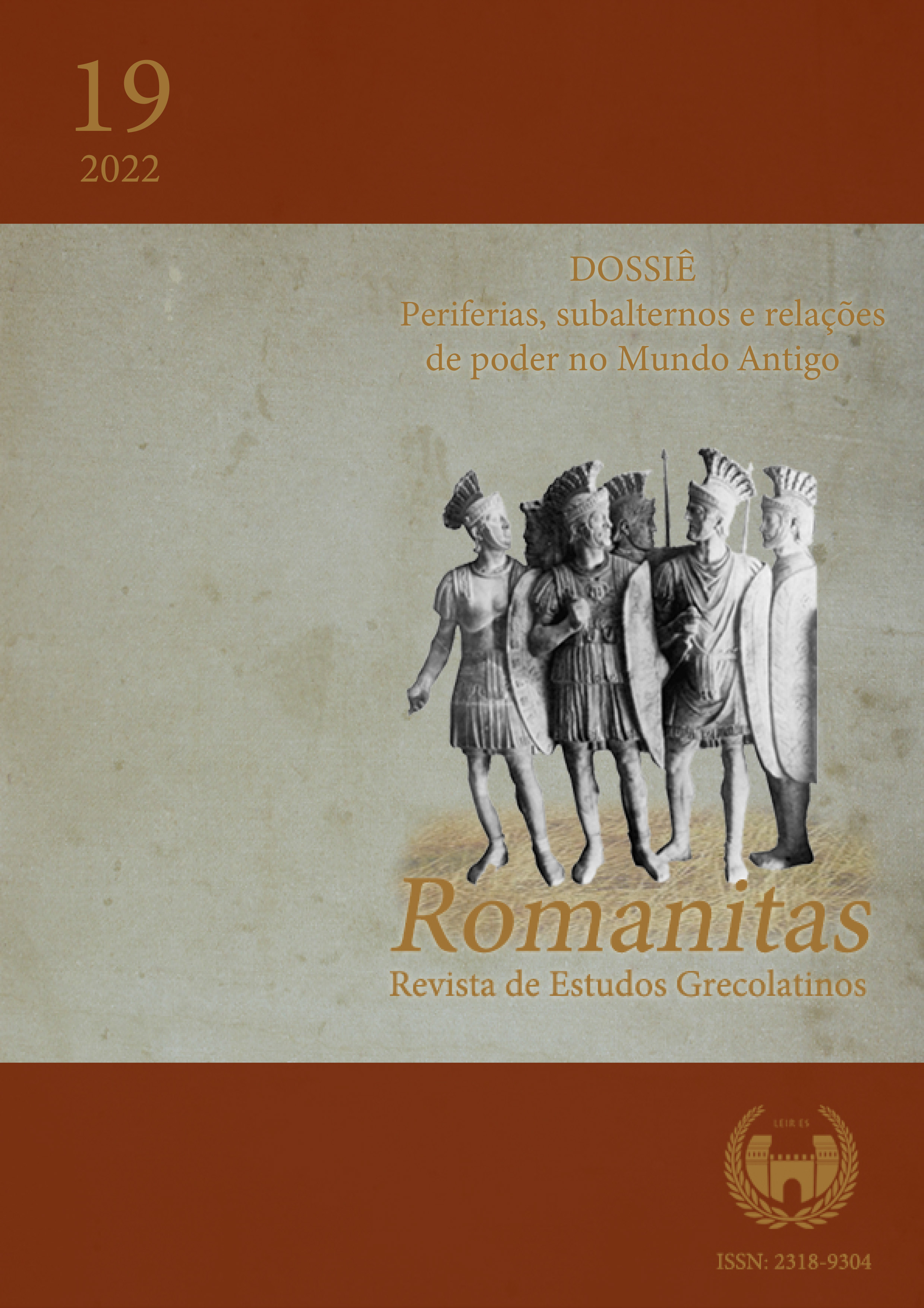Mobilizações coletivas na Roma tardo-republicana: repertórios de confronto e interesses nos 'Ludi Romani' (57 a.C.)
DOI:
https://doi.org/10.29327/2345891.19.19-5Palavras-chave:
Mobilização coletiva, República Tardia, Plebe urbana, Roma antigaResumo
Mobilizações coletivas eram uma resposta cada vez mais frequente, no século I a.C., a questões que afetavam diretamente a plebe urbana de Roma, especialmente, mas não apenas, no que se refere ao preço dos alimentos. Os limites impostos pela estrutura político-social da República e o aumento da violência política da época aprofundavam laços entre lideranças políticas e grupos populares, de forma que a dependência/agência da plebe em revolta com relação a lideranças da elite são um aspecto central para a compreensão deste processo. Este artigo tem como objetivo central refletir sobre as possibilidades de agência nas mobilizações coletivas da Roma tardo-republicana. Para tanto, busca-se nos conceitos de repertório de confronto, de Charles Tilly, e no estudo de caso da revolta dos Ludi Romani, em 57 a.C., compreender tais mobilizações em seus próprios interesses objetivos e em suas práticas de revolta.
Downloads
Referências
Documentação textual
APPIAN. Roman History: the civil wars, books 1-3.26. Translated by Horace White. Cambridge: Harvard University Press, 1913. 3 v.
ASCONIUS. Commentaries on speeches of Cicero. Translated by R. G. Lewis. Oxford: Oxford University Press, 2006.
CICERO. Letters to Atticus: volume I-XVI. Edited and translated by D. R. Shackleton Bailey. Cambridge: Harvard University Press, 1999.
CICERO. Pro Archia. Post Reditum in Senatu. Post Reditum ad Quirites. De Domo Sua. De Haruspicum Responsis. Pro Plancio. Translated by N. H. Watts. Cambridge: Harvard University Press, 1923.
DIO CASSIUS. Roman History. Translated by Earnest Cary, Herbert B. Foster. Cambridge: Harvard University Press, 1914. 3 v.
PLUTARCH. Lives: volume I-X: Translated by Bernadotte Perrin. Cambridge: Harvard University Press, 1919-1920.
SALÚSTIO. A Conjuração de Catilina e a Guerra de Jugurta. Tradução de Barreto Feio. Petrópolis: Vozes, 1990.
Obras de apoio
ALDRET, G. Riots. In: ERDKAMP, P (ed). The Cambridge Companion to Ancient Rome. Cambridge: Cambridge University Press, 2013.
ALONSO, A. Repertório segundo Charles Tilly: a história de um conceito. Sociologia & Antropologia, v. 2, p. 21-41, 2012.
BELCHIOR, Y. Iam Victum fama non visi Caesaris agmen (Luc. Phars. 2, 600): os boatos nas guerras civis entre Pompeu e César (54 – 48 a.C.), 2018. Tese (Doutorado em História) – Programa de Pós-Graduação em História Social da Universidade de São Paulo, São Paulo, 2018.
BRUNT, P. A. The Roman mob. Past & Present, n. 35, p. 3-27, 1966.
COURRIER, C. La plebe romain et sa culture. Rome: École française de Rome, 2014.
CARROLL, M. Infancy & earliest childhood in the Roman World: a fragment of time. Oxford: Oxford University Press, 2018.
ERDKAMP, P. A starving mob has no respect: urban markets and food riots in the Roman world, 100 BC – 400 AD. In. DE BOIS, L.; RICH, J. (ed.). The transformation of economic life under the Roman Empire. Brill: Amsterdam, 2002, p. 93-115.
FLAIG, E. Repenser le politique dans la République romaine. Actes de la recherche en sciences sociales, v. 105, 1994, p. 13-25.
FLAMBARD, J. Clodius, les collèges, la plèbe et les esclaves. Mélanges de l’École Française de Rome, t. 89, n. 1, 1977, p. 115-156.
FLOWER, H. The dancing lares and the serpent in the garden: religion at the Roman street corner. Princeton: Princeton University Press, 2017.
GARNSEY, P. Famine and food supply in the Graeco-Roman World: responses to risk and crises. New York: Cambridge University Press, 1988.
GRIG, L. Popular culture in the Ancient World. Cambridge: Cambridge University Press, 2017.
GUARINELLO, N. L. Violência como espetáculo: o pão, o sangue e o circo. História, v. 26, n. 1, p. 125-132, 2007.
GIDDENS, A. Social theory and modern sociology. Stanford: Stanford University Press, 1987.
HÖLKESKAMP, K-J. Reconstructing the Roman Republic: an ancient political culture and modern research. Princeton: Princeton University Press, 2010.
HORSFALL, N. The culture of the Roman plebs. Bristol: Bristol Classical Press, 2003.
KNAPP, R. Invisible romans. London: Profile Books, 2011.
LAURENCE, R. Rumor and communication in Roman politics. Greece & Rome, v. 41, n. 1, p. 62-74, 1994.
LINTOTT, A. W. Violence in Republican Rome. Oxford: Oxford University Press, 1968.
OLIVEIRA, J.; COURRIER, C. (ed.). Ancient History from below: subaltern experiences and actions in contest. London: Routledge, 2022.
OLIVEIRA, J. Late Antiquity: the age of crowds? Past & Present, v. 249, n. 1, p. 3-52, 2020.
MARSHALL, A. J. Symbols and showmanship in Roman public life: the fasces. Phoenix, v. 38, n. 2, p. 120-141, 1984.
McLACHLAN, B. Women in ancient Rome. London: Bloomsbury, 2013.
Downloads
Publicado
Como Citar
Edição
Seção
Licença

Este trabalho está licenciado sob uma licença Creative Commons Attribution-NonCommercial-NoDerivatives 4.0 International License.
a. Os autores mantêm os direitos autorais e concedem à revista o direito de primeira publicação.
b. Os autores têm autorização para assumir contratos adicionais separadamente, para distribuição não-exclusiva da versão do trabalho publicada nesta revista (ex.: publicar em repositório institucional ou como capítulo de livro), com reconhecimento de autoria e publicação inicial nesta revista.
c. Autores têm permissão e são estimulados a publicar e distribuir seu trabalho online (ex.: em repositórios institucionais ou na sua página pessoal) após a primeira publicação pela revista, com os devidos créditos.
d. Os textos da revista estão licenciados com uma Licença CC BY 4.0 Deed Atribuição 4.0 Internacional (CC BY).




























